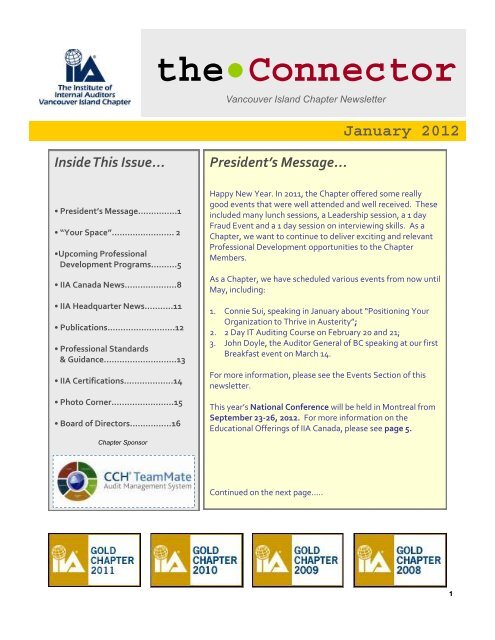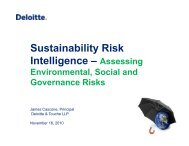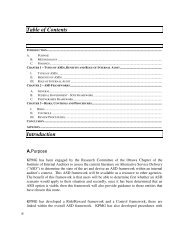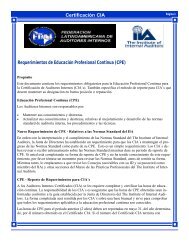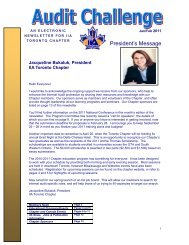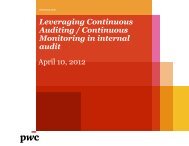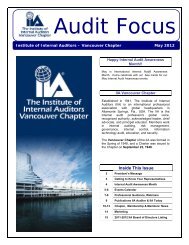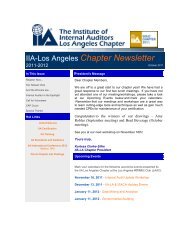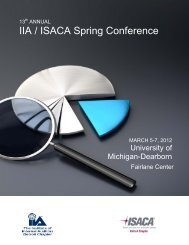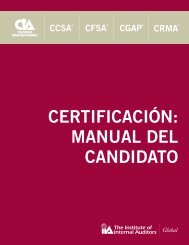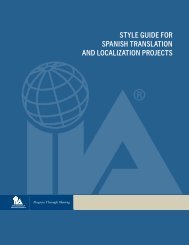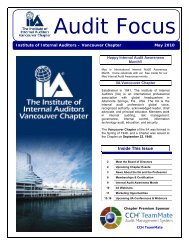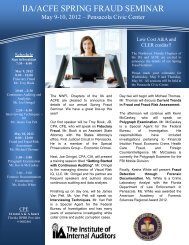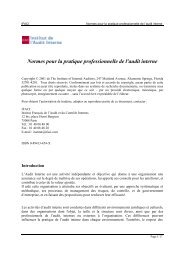the Connector - The Institute of Internal Auditors
the Connector - The Institute of Internal Auditors
the Connector - The Institute of Internal Auditors
Create successful ePaper yourself
Turn your PDF publications into a flip-book with our unique Google optimized e-Paper software.
<strong>the</strong> <strong>Connector</strong>Vancouver Island Chapter NewsletterJanuary 2012Inside This Issue...President’s Message...• President’s Message…….…..…1• “Your Space”….….………....… 2•Upcoming Pr<strong>of</strong>essionalDevelopment Programs.……...5• IIA Canada News……..….…..…8• IIA Headquarter News….…….11• Publications……………….….…12• Pr<strong>of</strong>essional Standards& Guidance……………….……...13• IIA Certifications……………….14• Photo Corner…..……….……...15• Board <strong>of</strong> Directors…………….16Chapter SponsorHappy New Year. In 2011, <strong>the</strong> Chapter <strong>of</strong>fered some reallygood events that were well attended and well received. <strong>The</strong>seincluded many lunch sessions, a Leadership session, a 1 dayFraud Event and a 1 day session on interviewing skills. As aChapter, we want to continue to deliver exciting and relevantPr<strong>of</strong>essional Development opportunities to <strong>the</strong> ChapterMembers.As a Chapter, we have scheduled various events from now untilMay, including:1. Connie Sui, speaking in January about “Positioning YourOrganization to Thrive in Austerity”;2. 2 Day IT Auditing Course on February 20 and 21;3. John Doyle, <strong>the</strong> Auditor General <strong>of</strong> BC speaking at our firstBreakfast event on March 14.For more information, please see <strong>the</strong> Events Section <strong>of</strong> thisnewsletter.This year’s National Conference will be held in Montreal fromSeptember 23‐26, 2012. For more information on <strong>the</strong>Educational Offerings <strong>of</strong> IIA Canada, please see page 5.Continued on <strong>the</strong> next page…..1
<strong>the</strong> <strong>Connector</strong>Vancouver Island Chapter NewsletterPresident’s Message (cont’d)<strong>The</strong> Interim Canadian Board has been busy developing a strategy and business plan for IIA Canada as wellas negotiating with IIA Global for services <strong>the</strong>y will provide to Canada. A new IIA Canada <strong>of</strong>fice has beenset up in Ottawa and staff can be reached at 1‐888‐671‐2228.We will be looking to recruit new Board members for June 2012 until May 2013. If you are interested,please contact any <strong>of</strong> <strong>the</strong> current Board at <strong>the</strong> contact numbers provided in <strong>the</strong> newsletter.All <strong>the</strong> best for 2012,Steve Ward, CA∙CIAPresidentAn Approach toRecords Management ReviewBy Teeravit Chintawongvanich, CIA“Your Space” CornerWith <strong>the</strong> over‐60‐year IIA’s motto “Progress ThroughSharing”, I believe each <strong>of</strong> us can always find a way toshare our knowledge, experience and insight with eacho<strong>the</strong>r. Chapter newsletter can be one <strong>of</strong> those.Recently I have seen several organizations havingrecords management on <strong>the</strong>ir audit plan. As I justundertook an assignment on records management(RM), this is an opportunity that I can share someinformation with you. This article contains points forreader’s information and/or consideration in <strong>the</strong>ir RMreview engagement, as opposed to a comprehensive list<strong>of</strong> audit criteria or a definitive way to a RM review.What Happens to Your Organizational Records?It is likely that <strong>the</strong> amount <strong>of</strong> those records has beenincreasing significantly over years. Advancedinformation technologies have enabled computer usersto create, transmit, receive and retain records withgreater ease. Depending on <strong>the</strong> level <strong>of</strong> acceptance andbusiness nature <strong>of</strong> your organization to retain <strong>of</strong>ficialrecords electronically, paper records management canalso represent a RM challenge.Identified dRisksikSeveral risks related to records management areidentified, through key questions, below.> “Where is <strong>the</strong> record?” This question can be <strong>the</strong>most important question when <strong>the</strong>re is a businessneed to retrieve a needed record from <strong>the</strong>organization’s record storage or electronic database.What constitutes a record is <strong>the</strong> pre‐requisitequestion, <strong>of</strong> course.> “What format and how long should <strong>the</strong> record beretained?” Compliance <strong>of</strong> legal obligations on recordretention can be ano<strong>the</strong>r challenge if a review <strong>of</strong>applicable statutes, laws, and regulations regardingrecords retention, has not been conducted at yourorganization. Particularly in case <strong>of</strong> litigations, <strong>the</strong>length <strong>of</strong> record retention can be much longer thannormal business requirements.2
<strong>the</strong> <strong>Connector</strong>Vancouver Island Chapter Newsletter“Your Space” Corner (cont’d)> “How should <strong>the</strong> record be destroyed?” If anorganization makes electronic image <strong>of</strong> <strong>the</strong> original paperrecords for <strong>the</strong> purpose <strong>of</strong> record retention in <strong>the</strong> course<strong>of</strong> normal business activities, <strong>the</strong> reliability <strong>of</strong> its recordsin court can be compromised without a properauthorization and destruction processes.> “How much resources are required to retrieve <strong>the</strong>record?” Operational efficiency is likely to be <strong>the</strong> result ifall questions are addressed promptly in yourorganization. This question is also applied in case <strong>of</strong> legaldiscovery processes.<strong>The</strong> records management process area included <strong>the</strong>adequacy and effectiveness <strong>of</strong> <strong>the</strong> process design. Asmy organization manages RM at corporate anddepartment levels, we reviewed <strong>the</strong> proceduraldocumentation and compliance monitoring separately.In addition, access control to paper records both onsiteand <strong>of</strong>fsite was also included. System access was notincluded as this was addressed in separate projects.As stated in <strong>the</strong> project’s purpose, we also touched oncompliance with FIPPA in regard to records retentionand destruction. <strong>The</strong> sufficiency <strong>of</strong> RM training was alsoincluded in <strong>the</strong> project scope.Review ApproachAn Approach for RM ReviewProject Purpose and ScopeIn <strong>the</strong> recent review <strong>of</strong> RM at my organization, ourprimary review purpose was to examine <strong>the</strong> adequacyand effectiveness <strong>of</strong> our records retention policy and <strong>the</strong>compliance with BC’s Freedom <strong>of</strong> Information andProtection <strong>of</strong> Privacy Act (FIPPA) in regard to recordsretention and destruction.We looked at <strong>the</strong> governance structure <strong>of</strong> <strong>the</strong> RMprogram and RM processes for both paper and electronicrecords. <strong>The</strong> governance area included <strong>the</strong> ownership androles and responsibilities <strong>of</strong> <strong>the</strong> RM program and <strong>the</strong>existence and sufficiency <strong>of</strong> corporate records retentionpolicy.For this review, we selected a cross section <strong>of</strong> variousdepartments across <strong>the</strong> organization, based on <strong>the</strong> level<strong>of</strong> electronic storage usage and our previous auditexperience. In addition to management interview anddocument review, we also conducted a survey onemployees’ awareness <strong>of</strong> <strong>the</strong> policy as part <strong>of</strong> assessing<strong>the</strong> policy’s effectiveness.Points for Information and/or Consideration<strong>The</strong> points randomly listed below may be helpful tointernal audit practitioners in planning <strong>the</strong>irengagement.Record Definition: <strong>The</strong> definition <strong>of</strong> a record can bevaried, depending on statutes, laws, regulations as wellas organizations.Length <strong>of</strong> Record Retention Requirements: For statutoryrequirements, many statutes (all levels <strong>of</strong> government)dictate how long records require to be retained. Manyare silent on <strong>the</strong> matter. As for limitation periods, <strong>the</strong>limitation periods vary from province to province and<strong>the</strong> obligation to retain <strong>the</strong> records in question may be avery long period <strong>of</strong> time.Legal Counsel Involvement: If your organization has alegal department, <strong>the</strong>y can assist in addressing whichstatutes, regulations and regulations are pertinent toyour business and any legal risks apparent to yourorganization.3
<strong>the</strong> <strong>Connector</strong>Vancouver Island Chapter Newsletter“Your Space” Corner (cont’d)Application <strong>of</strong> <strong>the</strong> RM Policy to <strong>the</strong> Third Party ServiceOrganization: This area may be ano<strong>the</strong>r area to include inyour engagement.Individual Staff’s Understanding <strong>of</strong> RM: <strong>The</strong> collectiveeffectiveness <strong>of</strong> a RM program begins with that <strong>of</strong>individual staff and follows with refreshing/ updatingtraining. <strong>The</strong> training can be programmed at <strong>the</strong> corporateand department levels or both.Scope <strong>of</strong> Electronic Records: What we included were <strong>the</strong>email system, network drives, SharePoint, portablecommunication devices, and portable electronic storagemedia.Location <strong>of</strong> records: A record can be stored in multiplelocations and multiple forms. An <strong>of</strong>ficial record’s locationand form can be a point for <strong>the</strong> review.Information Security Classification: This area could be part<strong>of</strong> <strong>the</strong> project or it can be a separate project itself.Better Practices VS Best Practices: Depending on yourorganizational priority, recommendations may aim toachieve better practices as opposed to best practices dueto business needs and resource requirements.Useful Document References‣ National Standard <strong>of</strong> Canada: Electronic Records AsDocumentary Evidence (CAN/CGSB‐72.34‐2005)‣National Standard <strong>of</strong> Canada: Micr<strong>of</strong>ilm and ElectronicImages as Documentary Evidence (CAN/CGSB‐72.11‐93)‣International Standard: Information andDocumentation – Records Management (ISO15489)Securing Personal Information: A Self‐Assessment Toolfor Organizationshttp://www.priv.gc.ca/resource/tool‐outil/securitysecurite/english/AssessRisks.asp?x=1Note: <strong>The</strong>re are overlapping contents between <strong>the</strong> ISOdocument and <strong>the</strong> Canadian Standard documents as <strong>the</strong>latter ones specially address electronic recordsmanagement. <strong>The</strong> ISO document provides <strong>the</strong> principles<strong>of</strong> RM regardless <strong>of</strong> <strong>the</strong> form <strong>of</strong> records.I hope you find <strong>the</strong> points noted useful. If you have a RMreview on <strong>the</strong> radar and would like discuss about it inmore details, feel free to contact me. You can alsocomment this article through this email:teeravit.ch@gmail.comcom►Attention all members ◄Doyouhaveanythingyouwouldliketoshare with your local IIA members? Hereis your space!To contribute to our chapter’s newsletter(plus you also earn CPE hours), pleasecontact me here. You will also receive afree lunch training event.4
<strong>the</strong> <strong>Connector</strong>Vancouver Island Chapter NewsletterVancouver Island Chapter’s Educational EventsJanuary – May 2012February 20-21IT Audit Workshop (Beginners &Advanced)Two-day workshopEarly bird ends Jan 30Chris Dunn, BCom in MIS, CISM, CISA,CRISC, CISSPIn our 2011 Survey our membership hasasked for workshops on IT Audit, ITGovernance, Disaster Recovery, BusinessContinuity and Threat Risk Assessments. Thisworkshop combines elements <strong>of</strong> all <strong>of</strong> thosetopics.An Information Technology (IT) or InformationSystems (IS) audit is an examination <strong>of</strong>controls within an IT infrastructure. Evaluation<strong>of</strong> obtained evidence determines if informationsystems are safeguarding assets, maintainingdata integrity, and operating effectively toachieve organizational goals and objectives.Assessing threats and vulnerabilities that canjeopardize crucial IT assets andrecommending appropriate risk managementstrategies can be a daunting task without asystematic ti approach to data collection andanalysis.January 25How to Position Your Organization toThrive in AusterityConnie Siu, Founder and president <strong>of</strong> CDCSynectics IncIn this presentation, learn how market placechanges impact your business, <strong>the</strong> urgency tooptimize efficiency and productivity, andwhere to focus in achieving operationalexcellence.March 14 Breakfast (TBD) John Doyle, BC Auditor GeneralApril 19 Luncheon (TBD) TBDMay 17 Luncheon (TBD) TBDFor registration to any <strong>of</strong> <strong>the</strong> above, go to <strong>the</strong> IIA Vancouver Island Website5
<strong>the</strong> <strong>Connector</strong>Vancouver Island Chapter NewsletterUpcoming IIA Canada Educational EventsJanuary 10February 142012 WebinarsWhat auditors need to know about RiskOversightRight Sizing <strong>the</strong> <strong>Internal</strong> AuditDepartment During Volatile EconomicTimes.Tim Leech, Managing Director GlobalServices, Risk Oversight.Tony Stanco, Toronto Hydro Corporation.March 13 Strategies for Managing g <strong>the</strong> Small Audit Scott Page, Wajax CorporationShopMay 15 Lean Auditing. James Paterson, Risk and assuranceconsultant, specialist in Lean Auditing,Chartered <strong>Institute</strong> <strong>of</strong> Public Finance andAccountancy (CIPFA).For registration to any <strong>of</strong> <strong>the</strong> webinars, go to <strong>the</strong> IIA Canada WebsiteMarch 20122012 Seminar WeekWill be held in Toronto, OntarioJune 2012November 2012Will be held in Winnipeg, ManitobaWill be held in Calgary, Alberta.For more information, go to <strong>the</strong> IIA Canada Website , or <strong>the</strong> chapter websitesSeptember 23 – 26National ConferenceWill be held in Montreal, QuebecFor more information, go to <strong>the</strong> IIA Canada Website , or <strong>the</strong> Montreal chapter website6
<strong>the</strong> <strong>Connector</strong>Vancouver Island Chapter NewsletterNon-IIA Upcoming Educational EventsAuditing and Securing Cloud-Based ServicesWhatISACA Victoria is providing a two-day leading edge course from MIS Training <strong>Institute</strong>. Wehave secured a very senior instructor who has extensive experience in security and audit <strong>of</strong>large-scale infrastructures.Cloud computing is going mainstream. All sizes and types <strong>of</strong> organization are making <strong>the</strong> shiftand learning <strong>the</strong> new paradigm. Organizations like <strong>the</strong> BC Government have begun assessinghow to use <strong>the</strong> cloud, not whe<strong>the</strong>r to use <strong>the</strong> cloud.As a Security, Audit or IT Operations pr<strong>of</strong>essional, you can get ahead <strong>of</strong> <strong>the</strong> pack inunderstanding <strong>the</strong> nature <strong>of</strong> cloud services and how security and audit applyWhen February 13 & February 14, 20128:30 AM to 4:30 PMWhereOffice <strong>of</strong> <strong>the</strong> Auditor General <strong>of</strong> BCFor registration and more information, go to <strong>the</strong> ISACA Victoria chapterJoint CMA-CGA-FMI CGA PD WorkshopWhat<strong>The</strong> <strong>the</strong>me for this year’s two-day workshop is Sustaining Government Finances. <strong>The</strong> first daywill focus on <strong>the</strong> challenges that will be faced by governments in <strong>the</strong> next 20 years, while <strong>the</strong>second day will consider how those fiscal challenges can be addressed.When February 28 & February 29, 2012WhereTBDRegistration will be available in early to mid‐January, 2012 at www.cmabc.com. Details on pricing andspeakers will be available at that time.7
<strong>the</strong> <strong>Connector</strong>Vancouver Island Chapter NewsletterIIA Canada NewsSuccessful Mid‐Year MeetingsNovember 29 and 30 th were notable dates in <strong>the</strong> progression <strong>of</strong> IIA Canada’s transition to its owninstitute. A Canadian delegation consisting <strong>of</strong> Brian Brown (IIA Canada Board Chair), Jeff Erdman(Canadian representative on <strong>the</strong> North American Board (NAB)) and Yaro Zajac (Executive Director IIACanada) were in Orlando to present <strong>the</strong> draft Canadian <strong>Institute</strong> (CI) Business Plan to both <strong>the</strong> NAB and<strong>the</strong> Global Executive Committee. During several public sessions <strong>the</strong> Chairs <strong>of</strong> <strong>the</strong> Global Board and NABcontinually affirmed <strong>the</strong>ir belief that Canada needs and deserves its own institute and emphasized <strong>the</strong>ircommitment to making that happen. And good news ‐ both governing bodies gave IIA Canada supportto continue with implementation <strong>of</strong> our transition plan.As a team, <strong>the</strong> Interim Canadian Board (ICB) and IIA Canada staff now turn <strong>the</strong>ir attention to finalizingand executing <strong>the</strong> CI Implementation Plan. With one year to be in full operation and key approval stepsduring 2012, time is <strong>of</strong> <strong>the</strong> essence. In addition to our own defined implementation milestones, certainexpectations have been established for <strong>the</strong> next step in <strong>the</strong> approval process – <strong>the</strong> GAM meetings inMarch 2012. As a result, <strong>the</strong> first quarter will be very busy for <strong>the</strong> Board and Staff, focusing on <strong>the</strong>following items:IT System –we are short‐listing potential vendors in preparation for negotiations on pricing. <strong>The</strong>system will deliver on four key components: member management; event management; CPD trackingand reporting; and website hosting. Upon implementation members will notice improvements that willallow maintenance <strong>of</strong> <strong>the</strong>ir own pr<strong>of</strong>iles, dues renewal in Canadian funds, on‐line event registration andpayment for Canadian education <strong>of</strong>ferings, ability to track <strong>the</strong>ir own CPD and, best <strong>of</strong> all, a redesignedwebsite for improved communications. <strong>The</strong> team will also be considering options for a financials<strong>of</strong>tware package suitable for an organization <strong>of</strong> our size.8
<strong>the</strong> <strong>Connector</strong>Vancouver Island Chapter NewsletterIIA Canada News (cont’d)Successful Mid‐Year Meetings…(cont’d)Service Delivery Methodology –now that preliminary assessments have been completed for <strong>the</strong>business plan, <strong>the</strong> team will be reviewing options and finalizing decisions on how best to deliver eachservice (i.e. through HQ, IIA Canada or via a third‐party) and pricing structure. Included in <strong>the</strong>se serviceswill be development <strong>of</strong> a model for both Quality Assurance Reviews and On‐site Training.Chapter/IIA Canada Service Delivery Framework – <strong>the</strong>re is a need for <strong>the</strong> roles and relationships withinCanada to be clearly defined prior to going live as an <strong>Institute</strong>. As discussed in <strong>the</strong> Canadian <strong>Institute</strong>Proposal and in recent sessions with your chapter leaders, we consider this an essential step to <strong>the</strong>future success <strong>of</strong> <strong>the</strong> institute. Although most <strong>of</strong> <strong>the</strong> work on this initiative will be undertaken in <strong>the</strong>second and third quarters, <strong>the</strong> initial terms <strong>of</strong> reference, team leadership, and project plan will bedeveloped in Q1. It should be noted that this initiative is not required for approval by NAB or Global.However, a stable well‐coordinated future Canadian operation maximizing <strong>the</strong> efforts <strong>of</strong> both parties ina clearly articulated document is a must. A project team <strong>of</strong> representatives from both chapters and IIACanada is being established so stay tuned for fur<strong>the</strong>r communication on <strong>the</strong> progress <strong>of</strong> this project in<strong>the</strong> near future.Education –<strong>the</strong> Committee is now finalizing <strong>the</strong> 2012 schedule for seminars, conferences, webinars etc.<strong>The</strong> plan will also detail development <strong>of</strong> <strong>the</strong> Audit Leadership program as a service to Chief AuditExecutives. Members will be interested in <strong>the</strong> committee’s research into new options to delivereducational products enabling us to fulfill our guiding principle <strong>of</strong> providing educational opportunitieswith Canadian content to all members regardless <strong>of</strong> <strong>the</strong>ir physical location. Also, in <strong>the</strong> first quarter, alonger‐term Education Strategy will be developed in conjunction with our chapters. This Strategy will<strong>the</strong>n drive <strong>the</strong> education program being developed for 2013, 2014, and beyond.National Conference –although not directly part <strong>of</strong> <strong>the</strong> transition, it is interesting to note <strong>the</strong> CanadianConference Advisory Committee’s initiative to improve upon <strong>the</strong> process for national conferences. <strong>The</strong>yare in <strong>the</strong> process <strong>of</strong> redesigning <strong>the</strong> model in which we deliver <strong>the</strong> National Conference providing moreconsistency and better control over <strong>the</strong> event while striving ii to increase attendance each year.Marketing program –to facilitate <strong>the</strong> transition and ensure that IIA Canada will be viable, it must solicitand consolidate support from a diverse group <strong>of</strong> stakeholders. <strong>The</strong> sponsorship program takes intoconsideration such factors as: limitations on <strong>the</strong> yield <strong>of</strong> <strong>the</strong> Canadian market; <strong>the</strong> availability <strong>of</strong>marketing assets and marketing reach; and as a new institute, IIA Canada requires a significantmarketing effort to sustain sponsor interest and create long‐term value. We have contracted <strong>the</strong>services <strong>of</strong> Electric Strategies to assist in development <strong>of</strong> a strategy to fulfill <strong>the</strong>se requirements. Nowstaff must hire appropriate resources and begin execution on this program.9
<strong>the</strong> <strong>Connector</strong>Vancouver Island Chapter NewsletterIIA Canada News (cont’d)Reserves – <strong>the</strong> ICB recognizes <strong>the</strong> need to establish a contingency fund to ensure <strong>the</strong> entity remains agoing‐concern. This fund may be needed in <strong>the</strong> event that <strong>the</strong> organization experiences a short termperiod <strong>of</strong> negative contribution. Best practices indicate this contingency should equate to three to sixmonths operating expenses, which in <strong>the</strong> case <strong>of</strong> IIA Canada amounts to approximately $750,000. Ourreserve strategy is divided into three parts:Founding Partner Program –part <strong>of</strong> <strong>the</strong> Marketing Program above, addresses this component<strong>of</strong> <strong>the</strong> reserve strategy. It is a one‐time opportunity to participate as a “Founding Partner” <strong>of</strong> IIACanada. All <strong>the</strong> funds generated through this program will be directed exclusively to <strong>the</strong>establishment <strong>of</strong> a reserve. Preliminary market analysis indicates interest in a program <strong>of</strong> thisnature in Canada. <strong>The</strong> next most important step is to complete Founding Partner marketingmaterials and launch <strong>the</strong> program with prospective partners.Canadian Chapter Support –each chapter manages its own funds per guidelines for ChapterFunds Management. For chapters that have sufficient i asset bases to cover <strong>the</strong>ir hi year‐to‐yearcash flow requirements, restricted and unallocated funds are typically invested to garner amodest, low risk return. IIA Canada has initiated negotiations with chapter leaders to designatea portion <strong>of</strong> <strong>the</strong>ir unallocated chapter funds to <strong>the</strong> IIA Canada Reserve. <strong>The</strong> concept is that <strong>the</strong>se“restricted” funds will be placed in a financial instrument, under IIA Canada control, that willcontinue to enjoy a modest, low risk return for <strong>the</strong> chapter yet be available to IIA Canada in <strong>the</strong>unlikely event <strong>of</strong> a negative net contribution. An appropriate governance and accountabilityframework would be established with <strong>the</strong> chapters to oversee <strong>the</strong> reserve fund activity. Thosechapters that have been approached have responded positively subject to some expectedcaveats (e.g. a thorough review <strong>of</strong> <strong>the</strong> Business Plan).IIA Headquarters ‐ Canadian members have had a significant impact in building <strong>the</strong> assets <strong>of</strong><strong>The</strong> IIA and in doing so have a “stake” in those assets. <strong>The</strong> ICB plans to identify a small group <strong>of</strong>individuals to continue to research and develop "options" for use during negotiations with HQ.Staffing –we have approval to proceed with staffing for 2012. It will be <strong>the</strong> responsibility <strong>of</strong> <strong>the</strong>Executive Director to progressively staff <strong>the</strong> <strong>of</strong>fice as needed to assist in not only service delivery, butalso for internal processes that will be required to support <strong>the</strong> institute.Business Plan –<strong>the</strong> document will be shared with a number <strong>of</strong> stakeholders to “reality test” <strong>the</strong>assumptions that have been used. Included in this audience will be all chapter leaders within Canada for<strong>the</strong>ir assessment and comment. Finally, <strong>the</strong> Pro Forma financial statements will be re‐challenged andsubjected to an “audit” by <strong>the</strong> IIA’s <strong>Internal</strong> Auditor.As you can see it will be a very busy first quarter <strong>of</strong> 2012. We will keep everyone updated along <strong>the</strong> way–so stay tuned.10
<strong>the</strong> <strong>Connector</strong>Vancouver Island Chapter NewsletterIIA Headquarter NewsIIA Launches New Video‐sharing SiteNovember 16, 2011In keeping with its motto <strong>of</strong> "Progress Through Sharing," <strong>The</strong> IIA today launched a new videosharingsite, AuditChannel.tv, that addresses <strong>the</strong> specific needs <strong>of</strong> internal auditors and <strong>the</strong> businesscommunity.With "video channels" focused on areas such as fraud, governance, risk, technology, operations,finance, compliance, and more, AuditChannel.tv enables internal audit pr<strong>of</strong>essionals worldwide tosearch for and post short videos (most are under five minutes in length) that address <strong>the</strong> topics <strong>of</strong>greatest interest to <strong>the</strong> pr<strong>of</strong>ession..IIA Audit Executive Center Declares ThreeImperatives for Crisis Management in 2012September 28, 2011From <strong>the</strong> BP oil spill to Hurricane Katrina to <strong>the</strong>tsunamis in Japan, crises <strong>of</strong> enormousproportions may strike at any time and havedevastating effects on life and economy.Some might say, “It won’t happen to us. ” Butwithout a thorough plan for responding to amultitude <strong>of</strong> potential events, organizationsare leaving <strong>the</strong>mselves wide open to <strong>the</strong> risks<strong>of</strong> poor crisis management.<strong>The</strong> <strong>Institute</strong> <strong>of</strong> <strong>Internal</strong> <strong>Auditors</strong> (IIA) AuditExecutive Center has put forth threeimperatives for crisis management that everyorganization and chief audit executive shouldmake a priority.Continued Growth <strong>of</strong> <strong>Internal</strong> AuditPr<strong>of</strong>ession Globally Prompts IIA to ExpandLanguage Offerings for Certification ExamsJanuary 3, 2012<strong>The</strong> <strong>Institute</strong> <strong>of</strong> <strong>Internal</strong> <strong>Auditors</strong> (IIA) hasimplemented an expanded translation anddelivery plan for its flagship exam, <strong>the</strong> Certified<strong>Internal</strong> Auditor® (CIA), as well as one <strong>of</strong> itsspecialty exams, <strong>the</strong> Certified GovernmentAuditing Pr<strong>of</strong>essional® (CGAP®).<strong>The</strong> translations included in this most recentexpansion <strong>of</strong> <strong>the</strong> certification program, whichinclude Hebrew, Arabic, and Estonian, are inresponse to continued growth <strong>of</strong> <strong>the</strong> internalaudit pr<strong>of</strong>ession globally and demand forcredentialed practitioners.11
<strong>the</strong> <strong>Connector</strong>Vancouver Island Chapter NewsletterPublications – IIA <strong>Internal</strong> AuditorIIA <strong>Internal</strong> Auditor is <strong>the</strong> world's leading publication covering <strong>the</strong> internal auditpr<strong>of</strong>ession. <strong>Internal</strong> Auditor magazine shares timely, helpful, indispensable information forpr<strong>of</strong>essionals who want to keep pace with <strong>the</strong> diverse, dynamic field <strong>of</strong> internal auditing.<strong>Internal</strong> Auditor content may be reprinted with <strong>the</strong> appropriate permission.Featured Articles in <strong>the</strong> December 2011 IssueRaising <strong>Internal</strong> Audit’s Potential ‐ By becoming a partner with <strong>the</strong> business, auditors can leverage<strong>the</strong>ir expertise to help <strong>the</strong> organization improve its operations.<strong>The</strong> Strategy Audit – A medical laboratory focuses on risk assessment in planning its growth andexpansion strategies.Auditing by‐products – Manufacturing industry auditors can gain insight into a business’s overallhealth by asking questions about <strong>the</strong> production and handling <strong>of</strong> <strong>the</strong>ir company’s secondary products.Big Ideas for Small Audit Shops – Several strategies g can help functions <strong>of</strong> modest size overcomeresource limitations and perform like <strong>the</strong>ir larger peers..Click Here for instant access to <strong>the</strong> December 2011 issue. Member login is required.Quick links……Like us on FacebookBlog with us12
<strong>the</strong> <strong>Connector</strong>Vancouver Island Chapter NewsletterPr<strong>of</strong>essional Standards & GuidanceIPPF ‐ <strong>The</strong> International Pr<strong>of</strong>essional Practices Framework (IPPF) is <strong>the</strong> conceptual framework thatorganizes authoritative guidance promulgated by <strong>The</strong> <strong>Institute</strong> <strong>of</strong> <strong>Internal</strong> <strong>Auditors</strong>PG ‐ Practice Guides provide detailed guidance for conducting internal audit activities. <strong>The</strong>yinclude detailed processes and procedures, such as tools and techniques, programs, and step‐bystepapproaches, as well as examples <strong>of</strong> deliverables.Practice Guides are restricted to IIA members onlyRecently Released Guidance from IIADecember 15, 2011IPPF Practice Guide Released: Reliance by <strong>Internal</strong> Audit <strong>of</strong> O<strong>the</strong>r Assurance ProviderThis practice guide utilizes <strong>the</strong> fundamental principles established by <strong>the</strong> Standards to provide aprocess for valuing <strong>the</strong> work <strong>of</strong> o<strong>the</strong>rs and assessing <strong>the</strong> reliability <strong>of</strong> assurance providers. Ultimately,responsible coordination attracts greater reliance on internal audit, decreasing <strong>the</strong> cost <strong>of</strong> complianceand increasing <strong>the</strong> efficiency for providing assurance. To view <strong>the</strong> revised Standards, as well as <strong>the</strong>marked‐up version showing changes from <strong>the</strong> existing Standards, visithttp://www.<strong>the</strong>iia.org/guidance/standards‐and‐guidance/ippf/standards/.Practice Guide –October 2011:Independence and Objectivity<strong>The</strong> importance <strong>of</strong> independence and objectivity, which has always been significant for internalauditors, continues to increase among <strong>the</strong> challenge►Attention all members◄Promotions? Moves? Retirement?Share your significant news with us andwe will be happy to share it with <strong>the</strong> rest<strong>of</strong> <strong>the</strong> members.Email me at krafiei@bcauditor.com13
<strong>the</strong> <strong>Connector</strong>Vancouver Island Chapter NewsletterIIA CertificationsWhy Become Certified?<strong>The</strong>re are many reasons to obtain an <strong>of</strong>ficial IIA certification designation. Whe<strong>the</strong>r it's <strong>the</strong> hallmark designation <strong>of</strong> internal audit,<strong>the</strong> Certified <strong>Internal</strong> Auditor® (CIA) designation, or one <strong>of</strong> our three specialty industry certifications – obtaining a certification helpsto define pr<strong>of</strong>essionalism.Six Steps to CertificationNot sure where to begin? Read through <strong>the</strong>se six steps on how to start <strong>of</strong>f on your trail to certifications with <strong>The</strong> IIA.Certification Frequently Asked Questions (FAQs)Read some <strong>of</strong> <strong>the</strong> frequently asked questions we receive about IIA certifications and exams. <strong>The</strong>se valuable questions and answerscan also help those auditors looking for a little more information on a specific area.<strong>The</strong> Various Certifications<strong>The</strong> IIA's Certified <strong>Internal</strong> Auditor® (CIA®) certification is <strong>the</strong> onlyglobally accepted designation for internal auditors. It is a four‐partexam that remains <strong>the</strong> standard by which individuals demonstrate<strong>the</strong>ir comprehensive competence and pr<strong>of</strong>essionalism in <strong>the</strong>internal auditing field.<strong>The</strong> IIA also <strong>of</strong>fers three specialty certifications: 1. Certification inControl Self‐Assessment® (CCSA®); 2. Certified GovernmentAuditing Pr<strong>of</strong>essional® (CGAP®); and 3. Certified Financial ServicesAuditor® (CFSA®). Individuals may choose to take a specialty examas credit for Part IV <strong>of</strong> <strong>the</strong> CIA exam or individuals who do not meet<strong>the</strong> CIA program education and experience eligibility requirementsmay wish to take one <strong>of</strong> <strong>the</strong> specialty certifications, which are one‐part exams.<strong>Institute</strong> <strong>of</strong> <strong>Internal</strong> AuditorVancouver Island ChapterBritish ColumbiaCanadaClick each tile forMore Info14
<strong>the</strong> <strong>Connector</strong>Vancouver Island Chapter NewsletterPhoto Corner – Recent EventsShane Troyer – BreakwaterAccounting Advisors LLP15
<strong>the</strong> <strong>Connector</strong>Vancouver Island Chapter NewsletterIIA Vancouver Island Chapter – Board <strong>of</strong> Directors for 2011-2012Position Name Organization ContactPresidentVice PresidentTreasurerSteve Ward,CA·CIATeeravitChintawongvanich,MBA, CMA, CIATony Graham,MBA, CMA, ACMA, BScbcIMC (250) 387-0509,Stephen.ward@bcimc.combcIMC (250) 952-7457,Teeravit.chintawongvanich@bcimc.comBC Ministry <strong>of</strong> Finance (250) 387-8111,Anthony.graham@gov.bc.caPast PresidentSecretaryProgramsProgramsProgramsTom Peerless,MBA, CMAAlina Zutz,BANijjy Potikanon,MBA, CIATanya Barrett,CMAGraham Tranter,CCSA, PMP, ITILHP AdvancedSolutions Inc.(250) 532-0307Tom.Peerless@hpadvancedsolutions.comPRA Group (250) 713 5984,Alinaz@pragroup.caBC PensionCorporation(250) 387-4280Nijjy.potikanon@pensionsbc.caBC Ministry <strong>of</strong> Finance (250) 356-5765,Tanya.Barrett@gov.bc.caUniversity <strong>of</strong> Victoria (250) 853-3185,gtranter@uvic.caMembership /Jackie Bruneau,BC Ministry i <strong>of</strong>(250) 952-8658,Certification CA, CIACitizens’ Services Jackie.bruneau@gov.bc.caWebmasterShaun Price,CA, CIA, BComMaritime ForcesPacific(250) 363-4530,Shaun.Price@forces.gc.caNewsletterKeyvan Rafieii Office <strong>of</strong> <strong>the</strong> Auditor(250) 419-6202,CA, CIAGeneralkrafiei@bcauditor.comMember-at-LargeChris Brown,CABC Ministry <strong>of</strong> Finance (250) 387-9237Chris.Brown@gov.bc.ca16


